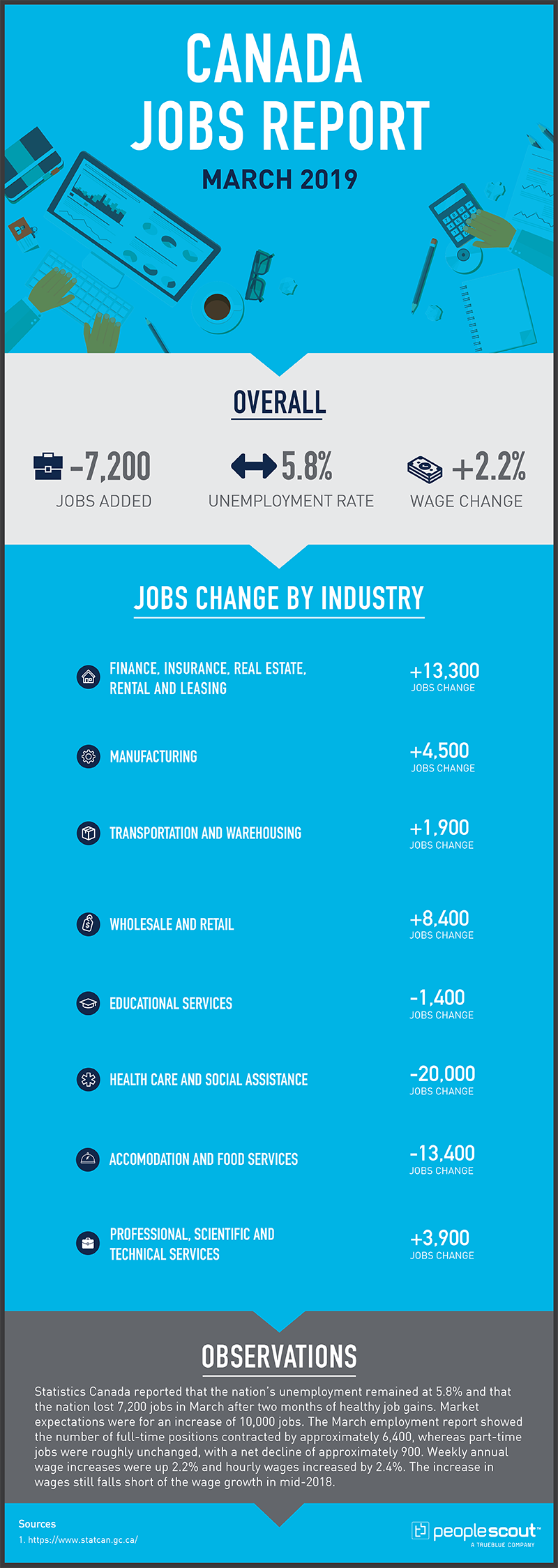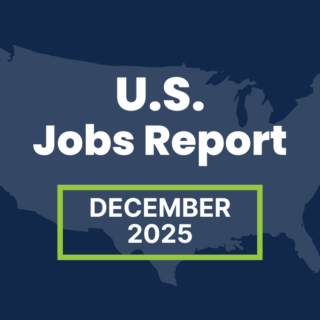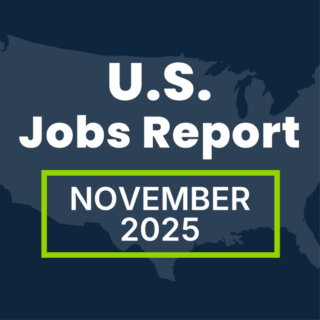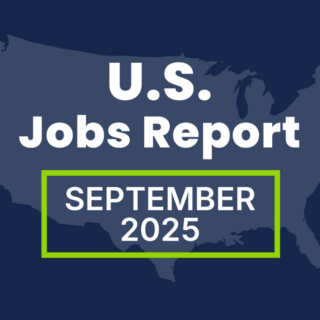Statistics Canada reported that the nation’s unemployment remained at 5.8% and that the nation lost 7,200 jobs in March after two months of healthy job gains. Market expectations were for an increase of 10,000 jobs. The March employment report showed the number of full-time positions contracted by approximately 6,400, whereas part-time jobs were roughly unchanged, with a net decline of approximately 900. Weekly annual wage increases were up 2.2% and hourly wages increased by 2.4%. The increase in wages still falls short of the wage growth in mid-2018.

The Numbers
7,200: The economy lost 7,200 jobs in March.
5.8%: The unemployment rate remained at 5.8%.
2.2%: Weekly wages increased 2.2% over the last year.
The Good
While the March Labour Market report released by Statistics Canada showed net job losses in March, the first quarter of 2019 saw 116,000 jobs added to the economy. On a year-over-year basis, employment grew by 332,000 (+1.8%), with gains in both full- (+204,000) and part-time (+128,000) work. Over the same period, total hours worked rose by 0.9%.
Despite the results in March falling below analyst expectations, the news was not received with particular concern:
“We got a little dip in employment, but the numbers are volatile and it’s been on a pretty strong run over the prior half year,” said Nathan Janzen, senior economist at Royal Bank of Canada.
Analysts said the small decline in March, following six months of consecutive gains, was unlikely to alter the Bank of Canada’s view of employment as a bright spot in Canada’s economy.
“After such a strong run of employment gains, a modest pull-back in March is of little concern to us and won’t raise many eyebrows at the Bank of Canada either,” said Andrew Grantham, Senior Economist at CIBC Capital Markets, in a note.”
The March reports also showed that more Canadians were working in the finance, insurance, real estate, rental and leasing industry and in public administration.
The labour market continued to improve in terms of wage increases. Annual hourly wage gains accelerated to 2.4% in March, the fastest annual gain since September, up from 2.3% in February. Pay gains for permanent employees rose to 2.3%, the strongest increase since August.
The Bad
Although the losses were modest, the March report was the first to report a decrease in jobs in seven months. Employment declined in health care and social assistance; in business, building and other support services; and in accommodation and food services. Canada’s two most populous provinces, Ontario and Quebec, lost jobs March.
While wage growth continues to pick steam, the rate of increase is smaller than in mid-2018. Concern over low wage growth was reflected in a recent poll conducted on behalf of Indeed Canada which showed that more than half of those surveyed plan to ask for a raise in 2019:
“Conducted by Censuswide on behalf of job site Indeed Canada, the research found that only 13% of Canadian workers surveyed are comfortable with their current rate of pay. That’s down from 17% from when Indeed commissioned the same survey one year ago.
The decline in salary satisfaction will prompt 53% of respondents to ask for more pay this year, the survey found.”
Widespread dissatisfaction over wages is a concern for Canadian employers because of pressure to raise salaries for their current workforce which may be prompted to look elsewhere to increase their incomes.
The Unknown
The US-Mexico-Canada (USMCA) trade agreement which was signed by the heads of state of the three respective countries has yet to be ratified by any of their legislatures. The agreement, which was created to replace NAFTA, could have a significant effect on important sectors in the Canadian economy. However, it is unclear what a final version of the USMCA would look like and whether it will be implemented at all. The Canadian Foreign Minister warned that changes to the original agreement could lead to chaos:
“Canadian Foreign Minister Chrystia Freeland on Thursday cautioned against the idea of reopening a new continental trade pact with the United States and Mexico, saying it could be a ‘Pandora’s box.’
U.S. House Speaker Nancy Pelosi told Politico this week that changes needed to be made to the text of the United States-Mexico-Canada (USMCA) trade deal to ensure its labor provisions could be enforced.
‘When it comes to the issue of actually opening up the agreement, that’s where Canada’s view is, we’ve done our deal,’ Freeland told reporters on the sidelines of a NATO meeting in Washington when asked about Pelosi’s comments.
‘This was a very intense negotiation. A lot of time, a lot of effort went into it, compromises were made on all sides, and we believe that people need to be very careful around opening up what could really be a Pandora’s box,’ she added…
‘Canada has done its share, we have done our work, and now it’s up to each country to work on ratification,” said Freeland.
She reiterated that Canada could find it hard to press ahead with efforts to ratify the treaty as long as U.S. maintained tariffs on imports of Canadians steel and aluminum.”




